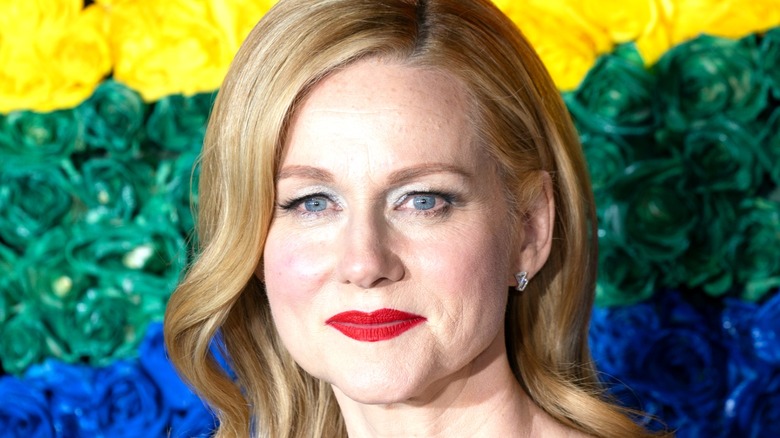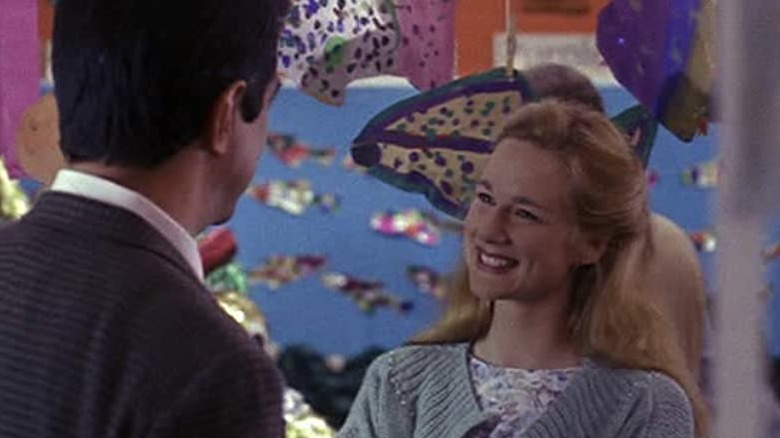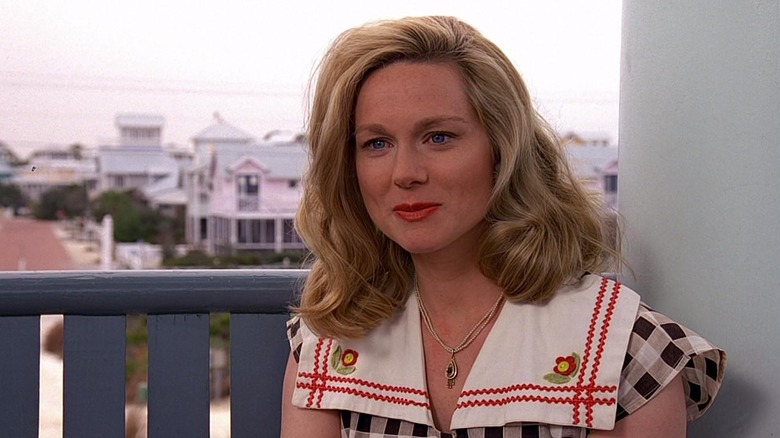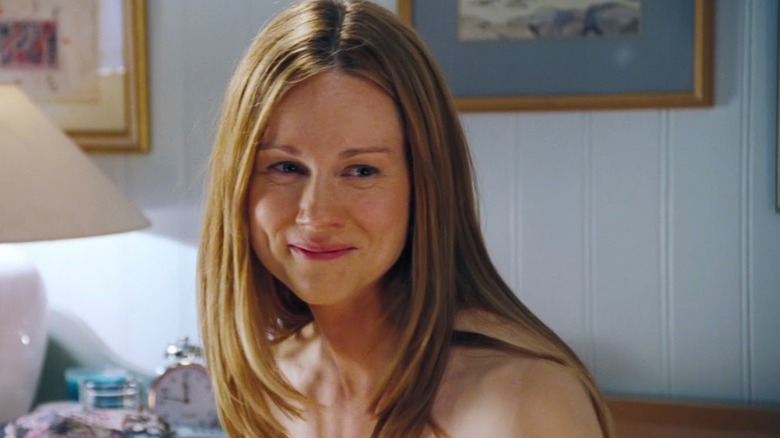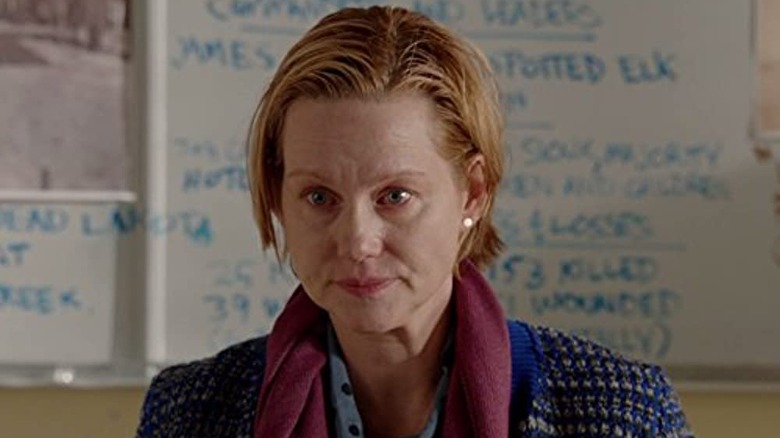The Transformation Of Laura Linney From Childhood To Ozark
Netflix began life as a streaming service that licensed shows and movies from other distributors, but it has come a long way. Over the past few years, Netflix has assembled a massive slate of its own original programming, and among the most prominent original shows featured there is the crime drama "Ozark," about a money launderer who relocates with his family from Chicago to Missouri, running afoul of the local crime gangs over the course of the show. The series has netted significant critical acclaim, and garnered numerous awards and nominations (via IMDb). And as any "Ozark" fan will tell you, one of the key elements that make the series work is the acting of Laura Linney, who plays Wendy Byrde, wife to money launderer Marty Byrde (Jason Bateman) — an intelligent and crafty figure who has become, some would argue, the most important character in the overall plot.
An accomplished performer in her own right, Linney's work on the show has been a critical component to its critical success, and it would be impossible to imagine the show without her. This is what the transformation of Laura Linney from childhood to Ozark has been like.
Laura Linney's father was a famous playwright
Laura Linney was born in New York City in February 1964. Her mother was a nurse, and her father was a professor, as well as a famous playwright who subsequently had a theater in New York named after him (per The New York Times). She was the only child of her parents' marriage, though she gained a step-sister from another marriage of her father's. She went to Northfield Mount Hermon School, a college-preparatory school, as a teenager, before briefly attending Northwestern University. She transferred from Northwestern to Brown University, later saying that she felt our of place at Northwestern, spurring her to study hard so she would have good enough grades to transfer (via The New York Times.)
During her time at Brown, Linney also appeared in the play "Childe Byron," which was written by her father, and revolved around the relationship between the poet Lord Byron and his daughter, mathematician Ada Lovelace, who Linney played. It was a rare instance for Linney, as she later spoke about her decision to consciously not appear in any work of her father's. "I knew that if I was lucky enough to get out of school and work professionally, that I would not go after any work of my dad's, for my sake as well as for him," Linney said in an interview in the show "Inside the Actors Studio," adding that "I thought while I have the opportunity, I might as well do it here."
Laura Linney's career began to rise in the nineties
Upon graduating from Brown, Linney attended Juilliard, a prestigious acting and dance academy that counts Patti LuPone, Anthony Mackie, Val Kilmer, and Oscar Isaac among its alumni. Upon graduating, Linney split her time between the stage and screen, appearing onstage in plays such as Henrik Ibsen's "Hedda Gabler" and Philip Barry's "Holiday." She also appeared onscreen in movies such as George Miller's "Lorenzo's Oil," in which she co-starred alongside Susan Sarandon, and Ivan Reitman's "Dave," which also starred Sigourney Weaver and Kevin Kline.
Linney's first major movie role came in the 1995 film "Congo," an adaptation of the Michael Crichton novel of the same name, in which she starred alongside Dylan Walsh and Tim Curry. In the film, Linney was Dr. Karen Ross, an electronics expert who travels to the Congo jungle with a group to discover the fate of her ex-fiancee, who went missing there while looking for the lost city of Zinj.
Linney's next major role came in the 1998 film "The Truman Show," opposite Jim Carrey, which also reunited her with Ed Harris, with whom she had co-starred in 1997's "Absolute Power." In the film, Linney played Hannah Gill, whom herself plays Meryl Burbank, wife to Truman Burbank, who is the unwitting star of his own reality show. Gill, who's aware of the reality show nature of Truman's life, ends up written off the show when she breaks character while threatened by Truman, who is trying to get at the truth about his life.
The 2000s brought Laura Linney numerous Emmy wins
As the decade turned, Linney's career continued to rise, as she added critical acclaim to her commercial success. She received her first Oscar nomination, for Best Actress, for her role in the 2000 film "You Can Count on Me," (per IMDb) which also marked the directing debut of filmmaker Kenneth Lonergan. In the film, Linney portrayed Sammy Prescott, a single mother trying to keep control of her life while her brother is in town.
Linney followed it up with a Emmy win for Best Actress in her first nomination, for the 2001 TV film "Wild Iris," in which she played Iris Bravard, a mother to a teenage son trying to cope with the suicide of her husband and the fraught relationship she has with her mother, played by Gena Rowlands.
Linney followed that up with a second Emmy win, this time for Outstanding Guest Actress in a Comedy series, for her role in the eleventh season of "Frasier." In the show, Linney plays Charlotte Connor, a matchmaker Frasier goes to see, whom he discovers has only five clients and effectively scammed him. Frasier develops feelings for Charlotte, which she seems to reciprocate, although she maintains a tumultuous relationship with her boyfriend. However, the two get together when she does break up with her boyfriend, only for the relationship to come to an abrupt end when Charlotte decides to move to Chicago. "Frasier" ends with Frasier on his way to Chicago in an attempt to reconcile with Charlotte and rekindle their relationship.
Laura Linney also received Oscar nominations for her work
Laura Linney also continued appearing on stage, starring in a 2002 revival of the Arthur Miller play "The Crucible" on Broadway, in which she starred alongside Liam Neeson. Neeson was also Linney's co-star in the 2003 ensemble romantic film "Love Actually," in which Linney played Sarah — a woman who has feelings for her coworker, Karl, but is overwhelmed by trying to take care of her brother, who lives in a mental health facility.
"Love, Actually" was one of three films Linney appeared in during 2003, as she also starred in the Clint Eastwood film "Mystic River," alongside Kevin Bacon and Tim Robbins, and "The Life of David Gale," alongside Kate Winslet. Following that, Linney reunited with Neeson in 2004 for "Kinsey," in which she played Clara McMillen, also known as Mac, who was the wife and fellow researcher to Alfred Kinsey, played by Neeson. The role netted Linney her second Oscar nomination, this time for Best Supporting Actress (per IMDb).
Linney garnered a third Oscar nomination for her work in the 2007 film "The Savages," in which she starred alongside Philip Seymour Hoffman, playing Wendy Savage, the younger of two siblings who reunite to take care of their ailing father, who both are estranged from. She followed it up with another Emmy win, this time for Best Actress, for her role in the HBO miniseries "John Adams," in which she was Abigail Adams, wife and advisor to John.
Laura Linney became a leading TV star
In 2010, Linney got a lead role of her own on television, in the Showtime series "The Big C." In the show, which ran for four seasons, Linney played Cathy Jamison, a high school teacher who discovers that she is suffering from melanoma, a form of skin cancer, and that she is in the terminal stage. Cathy keeps her diagnosis secret from those close to her, not wanting to add to their burdens, but makes questionable choices in her own life, like starting an affair. Her diagnosis becomes public knowledge in the second season, and she begins a treatment that ultimately proves futile, leading to Cathy and those around her to reconcile themselves to the inevitability of Cathy's death in the show's final season. The series ends with Cathy succumbing to her cancer. Linney received an Emmy nomination and an Emmy win for Best Actress for her work on the show (via IMDb).
Since then, Linney has reached new heights of fame with her role on Netflix's "Ozark." Her work on the series has garnered her two more Emmy nominations in the Best Actress category, bringing her total Emmy nominations up to seven, with four wins. Clearly, Linney is not going away anytime soon, and it remains to be seen if "Ozark" lands her another Emmy win to add to her impressive collection.
